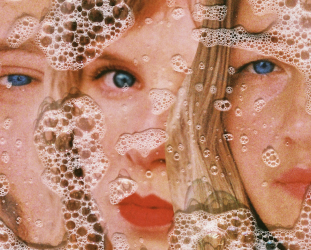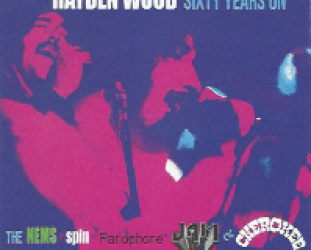Graham Reid | | 2 min read
Flip Grater: Exit Sign

At the time, Elsewhere critically noted Flip Grater's previous album When I'm Awake I'm At War was weighed down with the first person singular.
Every song was "I" (and invariably "you") and this trait can be endemic in singer-songwriters. The best get past that cloying self-obsession and use events in their lives or personal emotions to address more universal things.
You didn't get that sense with Grater.
Nothing wrong with "I" when it is sparingly deployed because there can be some universality about a highly personal experience/emotion . . . but over the long haul on her last album it just became a dead weight.
You can't help notice something similar happening on this album. (Anyone care to count the number of times "I" appears? I don't have a lyric sheet.)
However given greater life experiences -- her much vaunted year being poor in Paris and other travels -- plus more intelligently interesting arrangments and contexts, this one comes off as a considerable leap upwards, although Grater still sometimes positions herself as waif-like. But the harder times have brought more resilience and sometimes a confident conversational tone (Justin Was a Junkie which opens with the immediately engaging and confessional line, "The truth is . . .").
So this time out Grater explores far more rewarding territory on Pigalle: The Smell of Strangers is a wonderfully moody and musically disconcerting piece (think present day Marianne Faithful's lived-in voice, but younger) and the funereally slow duet with Nicolas Ker on To The Devil (co-written with Geoff Maddock, formerly of Goldenhorse) right at the end pulls you down like a whirlpool.
The album opens with one of her best songs, The Quit which starts "I'm quitting my life, cold-turkey". However this is no suicide note but announcement of a Tarot-like departure into something different, an emotionally blunt metaphor of what she has been through in the past couple of years.
As a gentle statement of intent -- with mournful strings, a pinging guitar -- it seems intuitively European, and that sense informs most of the album (which was recorded with French musicians in Paris). The dreamy and thoughtful Exit Sign -- another cleverly arranged piece -- has a breathy poetry which is familiar in French alt.pop. It's a standout.
When this is dark (as it frequently is) Grater reaches for a deeper place within herself and the songwriting is the stronger for it: Diggin' for the Devil is an intimately spooky piece with slashing guitar for further disconcerting effect and a counterpoint to her ghostly whisper.
Yes, Grater is still engrossed by her "I", but this time out she's a much more interesting "I", and -- on songs like the spare Hymn -- an I/eye which sees deeper, further and more penetratingly.
Prior to this, Flip Grater's music -- with the exception of a few songs -- has been juvenilia.
Her career starts with Pigalle, a mature album which works its special spell slowly and through multiple layers.
Highly recommended.
.

.







post a comment